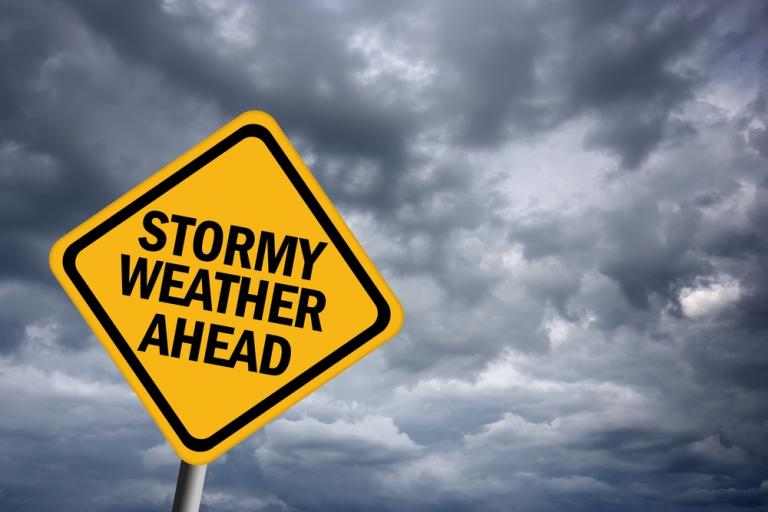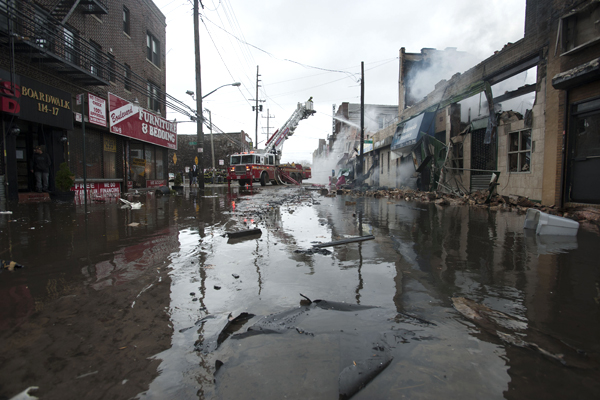It’s a ritual by now. Every time there’s some sort of extreme weather event — and there are lots these days — there ensues an argument over whether climate change “caused” it. Our own Susie Cagle has rounded up some good evidence that there’s a climate signal amidst the noise of natural variability. Some scientists insist there is no such signal evident.
If you read my June post on climate and causation, you know I think this is kind of a goofy, mostly semantic debate. I don’t really have anything to add. (On the subject of attribution, see Andy Revkin, Adam Frank, and Brad Plumer.)
Instead, I want to ponder a phenomenon that has been bugging me for a while. Thankfully, it now has a name, thanks to an essay from retired climate scientist Thomas Crowley. He sent the essay to Andy Revkin, who posted the whole thing and wrote a thoughtful post about it.
It’s called “reverse tribalism.” It goes like this: An extreme weather event takes place; climate activists (and the occasional journalist) make a connection to climate change; and then, a pack of climate wonks and journalists descends, scolding activists for exaggerating, going overboard, exceeding the bounds of evidence, and “giving the other side ammunition.” (That last bit is crucial. The idea that the scolds are saving the activists from themselves is what gives the scolding a patina of public purpose. Otherwise it’s just self-righteous hectoring.)
These folks accept climate change — they are of the climate “tribe” — but they spend most of their public communication efforts attempting to distinguish themselves from that tribe, casting the tribe as partisan, hysterical, and gripped by groupthink, themselves as independent, judicious, and devoted to the facts above all else. Thus, “reverse tribalism.” (It is similar to what I have long called “hippie punching” and it is a ubiquitous phenomenon in U.S. politics, not at all confined to the climate arena. There’s no more reliable way to establish one’s bona fides as a Serious Person than by bashing left activists.)
In his essay, Crowley says that climate reverse tribalism has gone overboard and is leading the scolds to go past the evidence in the other direction, “putting blinders on to the point of being blind to all but a pinprick of light.” I think he’s probably right. For the scolds, there are social and professional incentives that push strongly against anything that could be cast as “alarmism.” And virtually any mention of climate can be cast as “alarmism” by someone, so the scolds lean too far in the direction of tamping down climate talk.
Anyway. Revkin is perhaps the most prominent scold, and I’m always hassling him about it, as I did on Twitter yesterday:
To his credit, he’s good-humored enough to engage on this and self-aware enough to recognize that his counter-tribalist tendencies are worth examining. (In both these respects, he’s pretty much alone among the scolds.) He diagnoses his own case as “intertribal tension syndrome,” which is to say, he’s torn between being a climate hawk, a journalist, and a “defender of science.”
I think this gets at the root of what bothers me about these recurring debates between hawks and scolds. A false dichotomy has been established that leads both sides to miss the other side’s valid points.
From the climate hawk’s perspective, there is an intense, crazy-making urgency involved in all this. A humanitarian tragedy is heading our way and we are neither preparing for it nor working to reduce its severity. A catastrophe is unfolding, right in front of us, in slow motion. Somehow — no one knows how, but somehow — the American public must be made to appreciate that urgency and demand action. It is rare that an opportunity to highlight the climate crisis emerges out of the daily news scrum. When such an opportunity does emerge, climate hawks view it as a moral and political imperative to make the most of it.
This is not, contra the conventional wisdom among Villagers like Candy Crowley, some special interest group, “climate people,” mau-mauing to have its idiosyncratic preoccupation taken more seriously. It’s hundreds of millions of people, now and in the future, at risk. The question is not why some people take every opportunity to harp on it, but why more people don’t.
The scold’s response is that there’s no excuse to say or imply things that aren’t true. If you take murky probabilities and state them as categorical truths, you’re being dishonest. If you claim a hurricane is connected to climate change before there’s solid evidence that it’s outside the range of natural weather variability, you’re being dishonest. Maybe activists are allowed to do that (scolds imply, with proverbial noses in the proverbial air), but journalists and Serious People are not.
This is a Sophie’s Choice: If we respond to the moral imperative to raise public awareness and alarm about climate, we have to be deceptive. If we are committed to truth and scientific accuracy, we have to talk in hedged, caveat-filled, probabilistic language that is utterly ineffectual in reaching and activating a tuned-out public.
Dishonest or ineffectual. Alarmist or concern troll. Those are our choices?
The bulk of my sympathies are with climate hawks, obviously (why aren’t yours?). But I sometimes think they’ve maneuvered themselves into an unwinnable and distracting debate. When the public asks, “Did climate change cause this?” they are asking a confused question. It’s like asking, “Did steroids cause the home run Barry Bonds hit on May 12, 2006?” There’s no way to know whether Bonds would have hit the home run without steroids. But who cares? Steroids mean more home runs. That’s what matters.
By answering “yes” to a confused question, climate hawks cement that confusion and get themselves involved in an endless squabble that has the surface appearance of a scientific dispute, but is almost entirely a semantic dispute over the meaning of “cause.”
There is no division, in the physical world, between “climate change storms” and “non-climate change storms.” Climate change is not an exogenous force acting on the atmosphere. There is only the atmosphere, changing. Everything that happens in a changed atmosphere is “caused” by the atmosphere, even if it’s within the range of historical variability. Climate change is just the term we use to describe those changes.
But the scolds are missing something too: Forensic attribution — the complex science of picking out climate signals from weather noise — is not the only thing worth talking about in connection with climate and weather events! There’s no law that says that communicators must address the public in the probabilistic language of climate science, with all its jargon and hedges and opacity. And there’s no law that says climate communication should be judged by the standards of scientific language, or that scientific language is the only responsible, accurate form of language. We take this for granted in other areas — look at all the metaphors and parables and moralisms used around the deficit — but in climate, for some reason, we take scientism for granted. So when a climate hawk says, “Sandy is climate change,” scolds immediately reduce that message to a piece of scientific literalism — “Sandy couldn’t have happened in the absence of climate change” — and set about scolding.
But why do that? Most of the public doesn’t have a clue about climate science and never will, any more than they understand health science or biological evolution. That’s not a dig on the public; most people just have other priorities. What the public wants and needs is a sense of what climate change means, how it fits into their worldview, what values and feelings to associate with it. After all, I don’t know much about the physiological mechanisms by which smoking causes cancer. But I know what smoking means, the web of social and economic practices around it. And I know what cancer means. And I know what it means for one to lead to the other. I have a social and ethical context in which to situate those facts.
That’s the key missing ingredient on climate change: not a technical understanding of stochastic modeling, forensic attribution, and degrees of probability, but a visceral, more-than-intellectual sense of what climate change means. Most people simply lack a social and ethical context for it, so they end up jamming it into other, more familiar contexts (“big government,” “environmental problem,” “liberal special interest group”).
A storm like Sandy provides an opportunity for those who understand climate change to help construct that context. It provides a set of experiences — a set of images, sounds, smells, feelings, experiences — that can inscribe climate change with the cultural resonance it lacks. That’s what persuades and motivates people: not the clinical language of science, but experiences and emotions and associations. Of course communicating scientific facts is important too, but it’s not the primary need, nor the standard by which other communications should be judged. What scolds often do is interpret the language of emotion and association through the filter of science. That’s neither helpful nor admirable.
To wrap up, I’m going to share several tweets I sent out during the storm last night:
https://twitter.com/drgrist/status/263039430531620865
I’m not pretending these are some sort of genius communication strategy. It’s only Twitter. But note that none of them are phrased in the language of science (though none are scientifically inaccurate). Science is not the point. The point is to try to tell a story about climate change, to give a sense of what climate means, how it fits in the bigger picture.
Revkin seems to think that his allegiance to the journalist tribe means that he can’t communicate like this, in simple language with political, economic, and social resonance. Worse, he seems to think that being a journalist means he has to spend his time patrolling other people’s attempts at communicate and calling them out on reductive scientific grounds.
Don’t get me wrong, Revkin’s a fantastic journalist — one of the best on climate — and I would never ask him to leave that tribe. But I would suggest that reverse climate tribalism is neither a necessary nor a salutary means of expressing allegiance to journalistic ideals.





